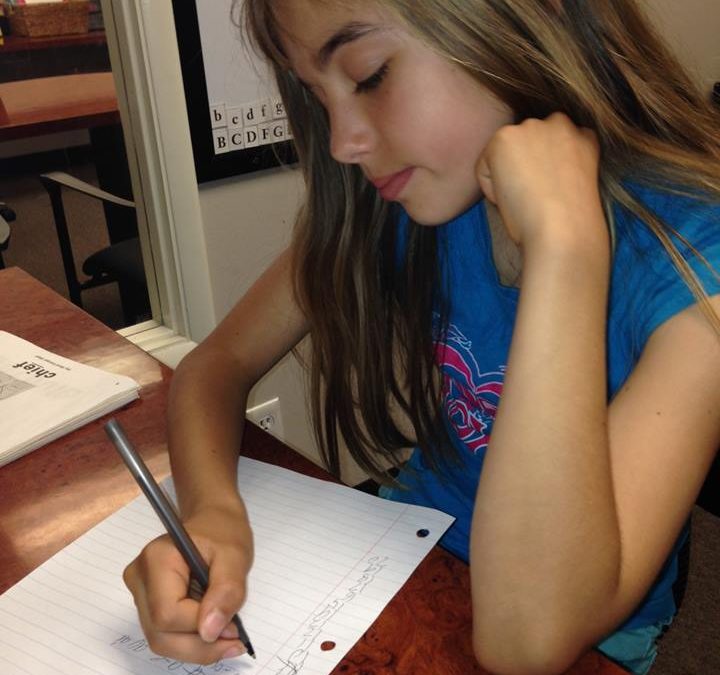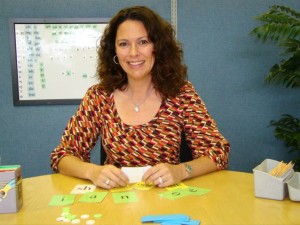
by PRIDE Reading Program Admin | Jul 12, 2017 | A PRIDE Post, Auditory Processing Disorder
The ability to process and learn from oral instructions and oral information is a fundamental skill required throughout life. So how can you help your child strengthen these skills? Here is a list of very easy do it at home activities that you can practice throughout the day to strengthen your child’s auditory processing.
End of the day review
Every night as you tuck your child into bed, discuss the events of the day. Have your child try to remember all the wonderful (or not so wonderful) things that happened that day. Can your child recall the events sequentially?
Play the game – what’s next?
Pick a room in your house and give your child two instructions. For example, “go into the dining room, grab a spoon and hide under the table.” Try to build up to 3 instructions over time. Then switch so that your child gets to give you instructions to follow too.
Follow my rhythm
You can clap a short pattern and have your child repeat it. Make it simple at first (one slow clap, two fast ones and then a slow one). Then slowly increase the complexity and loudness of the claps. Then ask your child to make up a pattern for you to repeat.
I went to the market and I bought…
This is a family game and can be played around the dinner table. Start with “I went to the market and I bought an apple.” The second person says, “I went to the market and I bought an apple an a banana.” The third person says, “I went to the market and I bought an apple and a banana and a bag of chips.” Etc. etc…
Listen to music and memorize the lyrics
Have your child listen to a song and learn to sing the lyrics. Give your child a song that they are unfamiliar with or one that they do not know the words to already. Replay the tune often until your child can sing the entire song.
Listen to Audio books
Audio books force a child to listen. Pick a story that your child enjoys and is excited about listening to. Don’t hesitate to choose books they have already read. Repetition builds understanding, and we all love to read or listen to our favorite books over and over again.
Play Mother May I
Have your child line up and face you (about 20 feet away). Then give your child 2 commands such as, “Take 3 steps forward and touch your nose with your right pinky finger. Or, hop forward 2 hops then do the chicken dance.” The child will ask, “Mother may I?” You answer yes or no. When your child finally gets to you – switch roles. Eventually try to get up to 3 commands.
Memorize a Poem
Have your child memorize a poem and recite it to you. Aim for memorization of at least four to eight short poems during the school year. Keep reciting the old ones and build up a repertoire. Try to pick poems that the child has read and enjoyed. This can begin with simple fun ones and then eventually increase to some rich and deep poetry too.
When you strengthen your child’s auditory processing skills, remember to make it a fun experience for both you and them. Just a few minutes a day with some of the above mentioned activities will hopefully make a big difference.
Learn more about the New PRIDE Reading Program
________________________________________________________________________________

Karina Richland, M.A., developed the PRIDE Reading Program, an Orton-Gillingham program for struggling readers, based on her extensive experience working with children with learning differences over the past 30 years. She has been a teacher, educational consultant and the Executive Director of PRIDE Learning Centers in Southern California. Please feel free to email her with any questions at info@pridelearningcenter.com.

by PRIDE Reading Program Admin | Jan 26, 2017 | A PRIDE Post, Auditory Processing Disorder
Children with auditory processing disorder will often struggle in a classroom setting, especially in the areas of following directions, reading, spelling, writing and comprehension. Auditory processing disorder results in a child mis-hearing, mis-pronouncing, and mis-repeating information. These children often have difficulty hearing the difference between sounds or words that are similar (coat/boat or sh/ch/. If you can’t hear the sounds properly, you can’t say the sounds properly you will also not read or write the sounds properly.
Here are some strategies for teachers and other professionals that work with children diagnosed with an auditory processing disorder in the classroom:
- Sit the child as close to the teacher as possible. Most children with auditory processing disorder will have difficulties hearing among other noises. If the child is sitting towards the back of the class he will only hear the sounds surrounding him – not the teacher’s voice. Therefore, just by moving the child nearer to the sound, at the front of the class will make a huge difference.
- Have the child look at the speaker. The child with auditory processing disorder needs to see the face and mouth of the speaker. Give the child as much eye contact as possible.
- Encourage all participants in the classroom to project their voices clearly. So many children have soft voices. When the teacher is asking questions and calling on students, the teacher can repeat the answer of the quieter voiced children so that everyone is able to hear and understand the answer. Not being able to hear is a lost opportunity for learning!
- Implement lots of visual images. Using visual stimuli when explaining will give the child with auditory discrimination problems lots of clues. These can include charts, pictures or illustrations. Teachers can use their own body language to serve as a visual. This could be hand movements or facial expressions. Think of ESL teachers and how they utilize TPR (total physical response).
- Praise the child often for being a good listener!
_______________________________________________________________________
Karina Richland is the Founder and Director of Pride Learning Centers, located in Los Angeles and Orange County. Ms. Richland is a certified reading and learning disability specialist. Ms. Richland speaks frequently to parents, teachers, and professionals on learning differences, and writes for several journals and publications. You can reach her by email at karina@pridelearningcenter.com or visit the Pride Learning Center website at: www.pridelearningcenter.com

by PRIDE Reading Program Admin | Apr 10, 2016 | A PRIDE Post, Auditory Processing Disorder
Students with Auditory Processing Disorder (APD) have significant difficulties in identifying and discriminating sounds despite having normal peripheral hearing. These students often have reading difficulties due to significantly poor phonological awareness, decoding ability and grapheme knowledge. Time and again a student with Auditory Processing Disorder will lack the necessary reading foundation skills that are essential in becoming a strong reader.
Early Intervention
Diagnosis is the essential first and most important step in successfully teaching a student with Auditory Processing to read. The sooner a child with Auditory Processing Disorder is given proper reading interventions, particularly in the very early grades, the more likely it is that they will have fewer or milder difficulties in reading later in life. A child with Auditory Processing that is not identified until the third grade or later is already years behind his or her classmates. The entire reading foundation needs to be taught at this point. This is a gap that must be closed if the child is ever to catch up with his peers. The best intervention is prevention in kindergarten or remediation beginning in the first grade.
Intensive Reading Instruction
For the child diagnosed with Auditory Processing Disorder that is already behind his peers in reading, intervention will need to be delivered with great intensity. Keep in mind that this child is behind his classmates and must make more progress if he is to ever catch up. The rest of the class does not stand still to wait, they continue forward. Taking a few lessons once or twice a week will never give the student with Auditory Processing the opportunity to catch up. He must make a giant leap; if not, he will always remain behind.
A child with Auditory Processing Disorder who is not identified early may require as much as 150 to 300 hours of intensive instruction if he is ever going to close the reading gap between himself and his peers. The longer identification and effective reading instruction are delayed, the longer the child will need to catch up. In general, it takes 100 hours of intensive instruction to progress one year in reading level. The sooner this remediation is completed, the sooner the child can progress forward with his peers.
High Quality Reading Instruction
Teaching a child with Auditory Processing how to read needs to be provided by a highly qualified teacher. A teacher’s knowledge of how children learn to read as well as her experience teaching a specific program will ultimately determine the success of the child. These students will need a very structured, systematic, cumulative, repetitive and multisensory teaching method such as the Orton-Gillingham approach. By using a multisensory approach the student will be able to learn using the visual and kinesthetic modalities while simultaneously strengthening the auditory channels.
In Orton-Gillingham, the phonemes are introduced in a systematic, sequential and cumulative process. The Orton-Gillingham teacher begins with the most basic elements of the English language. Using repetition and the sequential building blocks of our language, phonemes are taught one at a time. This includes the consonants and sounds of the consonants. By presenting one rule at a time and practicing it until the student can apply it with automaticity and fluency, students with Auditory Processing Disorder have no reading gaps in their word-decoding skills. As the students progress to short vowels, they begin reading and writing sounds in isolation. From there they progress to digraphs, blends and diphthongs.
Students with Auditory Processing are taught how to listen to words or syllables and break them into individual phonemes. They also take individual sounds and blend them into a word, change the sounds in the words, delete sounds, and compare sounds. For example, “…in the word steak, what is the first sound you hear? What is the vowel combination you hear? What is the last sound you hear? Students are also taught to recognize and manipulate these sounds. “…what sound does the ‘ea’ make in the word steak? Say steak. Say steak again but instead of the ‘st’ say ‘br.’- BREAK!
Every lesson the student learns is in a structured and orderly fashion. The student is taught a skill and doesn’t progress to the next skill until the current lesson is mastered. As students learn new material, they continue to review old material until it is stored into the student’s long-term memory. While learning these skills, students focus on phonemic awareness. There are 181 phonemes or rules in Orton-Gillingham for students to learn. Advanced students will study the rules of English language, syllable patterns, and how to use roots, prefixes, and suffixes to study words. By teaching how to combine the individual letters or sounds and put them together to form words and how to break longer words into smaller pieces, both synthetic and analytic phonics are taught throughout the entire Orton-Gillingham program.
Students with Auditory Processing Disorder need more structure, repetition and differentiation in their reading instruction. They need to learn basic language sounds and the letters that make them, starting from the very beginning and moving forward in a gradual step by step process. This needs to be delivered in a systematic, sequential and cumulative approach. For all of this to “stick” the students will need to do this by using their eyes, ears, voices, and hands.
Learn more about the New PRIDE Reading Program
_________________________________________________________________________________________________

Karina Richland, M.A. is the Founder of PRIDE Learning Centers, located in Los Angeles and Orange County. Ms. Richland is a certified reading and learning disability specialist. You can visit the PRIDE Learning Center website at: www.pridelearningcenter.com

by PRIDE Reading Program Admin | Feb 20, 2016 | A PRIDE Post, Auditory Processing Disorder
Almost every school activity, including listening to teachers, interacting with classmates, singing along in music class, following instructions in physical education, etc, depends on the ability for students to process sounds and have a strong auditory system in learning. But what happens if this auditory system has deficits? Can a child still learn?
Does my child have Auditory Processing Disorder?
Auditory Processing (APD) is a very common learning disability and affects about 5% of school-age children. Auditory Processing can present itself with many different symptoms and behaviors. Often these behaviors resemble those seen with other learning challenges, like language difficulties, attention problems and autism. Most children with auditory processing difficulties show only a few of the following behaviors. No child will show all of them. However, any child who displays several of these symptoms should be carefully evaluated for auditory processing disorder.
- Delayed speech.
- Persistent articulation errors.
- Abnormally soft, loud, flat, formal, or “pedantic” speaking voice.
- Difficulty conducting casual conversations.
- Difficulty reading or spelling due to problems discriminating word sounds.
- Difficulty following oral directions.
- Difficulty organizing behaviors.
- A tendency to appear quiet, distracted, or off topic during group discussions or to interrupt or blurt out answers.
- Long delays before responding to questions or instructions.
- Preferences for nonverbal tasks or a markedly higher performance IQ than verbal IQ.
- Difficulty taking notes.
- Worsening performance in higher grades as oral instruction load and receptive language demands increase.
- Difficulties with inference, abstraction, and figurative language.
- Difficulty hearing in the presence of background noise.
- Difficulty understanding what’s said.
- A tendency to ask for restatement or clarification, or repeatedly saying “what?” or “huh?”
- Marked difficulty understanding speakers with particularly high or low-pitched voices or with prominent accents.
How does Auditory Processing affect my child’s learning?
Children with Auditory Processing Disorders have difficulties distinguishing the sounds or phonemes in spoken words, especially those in complex words and sentences. This is referred to as Auditory Discrimination Deficits. If a child has difficulties discriminating sounds in language, then words will sound unclear or distorted as well as many will sound alike. This in turn will affect a child’s development of language skills. They may have trouble speaking and listening, because of problems learning basic grammar and word meanings. Many vowel and consonant sounds may sound the same to them, especially when spoken quickly. As a result, not only will they have difficulty hearing the differences between words that sound alike (think, thing, sink, thin) they will also have difficulty understanding the connections between those words and the letters used to represent them.
This is why children with Auditory Processing Difficulties often have trouble with reading and spelling. Since they cannot hear the sound distinctions between words, the rules linking sounds to letters and letter groups can be hard for them to master.
Most children with Auditory Processing Disorder have difficulty hearing in the presence of background noise. This is referred to as Auditory Figure-Ground Deficits. Although the children often hear well enough at home or in quiet environments, they may appear hard of hearing or even functionally deaf in noisy environments such as school.
In the classroom, a child with Auditory Processing Deficits will have great difficulties staying focused on a listening task. This is referred to as Auditory Attention Deficits. If a teacher is giving a lecture, for example, the student might listen in for a few minutes but then drift off and daydream missing out on significant amounts of information.
Students with Auditory Processing Challenges have great difficulties remembering information given. This is referred to as Auditory Memory Deficits. If the teacher says, “get a piece of paper and a pencil out of your desk and write down your spelling words,” the student may get confused because there are too many commands at once. Impairments in the auditory memory deficits can severely weaken not only long-term memory but also language development and comprehension.
How can a child with Auditory Processing Disorder get help?
The sooner a child with Auditory Processing Disorder is given proper teaching strategies, particularly in the very early grades, the more likely it is that they will have fewer or milder difficulties later in life. These students will need a very structured, systematic, cumulative, repetitive and multisensory teaching method such as the Orton-Gillingham approach. By using a multisensory approach the student will be able to learn using the visual and kinesthetic modalities while simultaneously strengthening the auditory channels.
The best learning environment for a student with auditory processing is always one-to-one with very minimal distractions and outside noises. Students who have severe auditory processing disorder may need an intensive training program to catch up and stay up with the rest of their class. During this intensive training, students will overcome many reading, writing, spelling and comprehension difficulties and learn strategies that will last a lifetime.
Teachers and parents both need to remember that Auditory Processing Disorder is a real condition. The symptoms and behaviors are not within the child’s control. Children with Auditory Processing Disorder are not being defiant or being lazy. A child with Auditory Processing Disorder can go on in life and become just as successful as other classmates.
Learn more about the New PRIDE Reading Program
________________________________________________________________________________________

Karina Richland, M.A. is the Founder of PRIDE Learning Centers, located in Los Angeles and Orange County. Ms. Richland is a certified reading and learning disability specialist. Ms. Richland speaks frequently to parents, teachers, and professionals on learning differences, and writes for several journals and publications. You can reach her by email at karina@pridelearningcenter.com or visit the PRIDE Learning Center website at: www.pridelearningcenter.com

by PRIDE Reading Program Admin | Jan 3, 2016 | A PRIDE Post, Auditory Processing Disorder
Having strong language skills is very important in school. Students who have auditory processing disorder have weaker language skills compared to others of their age and can therefore have serious problems as students. Even though individuals with auditory processing disorder are intelligent in other important ways, students with language disorders are apt to find school especially difficult and sometimes frustrating and embarrassing.
Kinds of problems that students with Auditory Processing face:
- Vocabulary:
Students with auditory processing are sometimes slower at learning, understanding and using new words.
- Comprehending spoken language: Some students with auditory processing feel that the teacher is speaking much too fast. They start getting mixed up or confused when a teacher gives them complicated instructions or explanations.
- Reading: Individuals with auditory processing disorder might find themselves falling far behind in their reading skills. In the beginning grades, these children might have trouble sounding out or identifying individual words because of poor phonemic awareness and phonological processing skills. Others might understand the sounds but have troubles remembering them. As the grades get higher, these students often have more and more difficulty with understanding or remembering what was read which hinders their reading comprehension skills.
- Communicating ideas in words: Sometimes students with auditory processing skills have a strong vocabulary but have difficulties recalling, finding and using the right words quickly when they need them. This hinders their abilities to participate in classroom discussions or makes them nervous when they are called upon in class. Many times these students have excellent ideas but difficulties expressing them in language.
- Writing and Spelling: Students who have difficulties expressing their ideas out loud often also struggle expressing themselves on paper. Compositions, book reports, essays and stories are a huge obstacle of them. Because these kids don’t have a strong sense of the sounds of the language, they will struggle in spelling. They won’t apply spelling rules, usually spelling the words exactly as they look.
What can be done about Auditory Processing Disorder?
Get Help from Teachers:
- A teacher needs to be informed that the student does indeed have an auditory processing disorder and how this might affect the student’s classroom performance.
- The teacher dealing with a student with auditory processing needs to be flexible in their approach, so that they can find a method that suits the child, rather than expecting that all students will learn in the same way.
- The teacher can be cautious not to talk too quickly or in sentences that are too long or complicated.
- The teacher can give the student some visuals and illustrations on what is being said.
- Most often, the student with auditory processing needs to sit in the very front of the class so that he or she can listen and focus on the language better.
- The teacher can also give the student extra time for a response when asked a question, or focus more on yes and no questions for these students.
Get Outside Professional Help:
Students with Auditory Processing Disorders will need extra outside the school help with reading, writing, and spelling. The tutor who does this should be knowledgeable and experienced in working with students with learning disabilities and trained in a reputable multisensory Orton-Gillingham reading, writing, spelling ad comprehension program.
Many students with Auditory Processing benefit greatly when working together with a speech and language therapist. Speech Therapists have been specially trained to work with individuals who are having difficulties understanding or communicating. Both the tutor and the speech therapist can work side by side and also help the classroom teacher understand auditory processing and the student’s language difficulties.
Don’t Give Up!
Students that have Auditory Processing Deficits should never get discouraged. Most of these students do improve as they go through school. However, there might be some students who fall behind in school because of their language problems. It is easy for these kids to get discouraged and give up. When this happens their academic skills end up further behind those of kids who get a lot of practice through schoolwork. Work hard and stay motivated. Get outside help and stay positive.
_________________________________________________________________________

Karina Richland, M.A. is the Founder and Director of PRIDE Learning Centers, located in Los Angeles and Orange County. Ms. Richland is a certified reading and learning disability specialist. Ms. Richland speaks frequently to parents, teachers, and professionals on learning differences, and writes for several journals and publications. You can reach her by email at karina@pridelearningcenter.com or visit the PRIDE Learning Center website at: www.pridelearningcenter.com

by PRIDE Reading Program Admin | Apr 24, 2015 | A PRIDE Post, Auditory Processing Disorder
At PRIDE Learning Center, we offer Auditory Processing reading help. It is just amazing how well our kids learn to read, write and comprehend using an Orton-Gillingham reading program.
What is Auditory Processing Disorder?
Auditory Processing is a language processing disorder where a child has significant trouble processing sounds, particularly with the sounds associated with speech. It is a very common learning disability and affects about 5% of school-age children. PRIDE Learning Center offers Auditory Processing Reading Help by using an Orton-Gillingham reading program. This is the program that we at PRIDE are experts at!
What is Orton-Gillingham?
Dr. Samuel T. Orton and Dr. Anna Gillingham developed the Orton-Gillingham approach in the 1930’s. In Orton-Gillingham reading is taught sequentially proceeding from single letters and symbols to one-syllable words and then to longer words. Multisensory approaches are emphasized throughout, with each step of instruction incorporating auditory, visual, and kinesthetic channels. Writing and letter formation are taught systematically, one letter at a time, and each lesson includes emphasis both on auditory and visual aspects of letters and words. Orton-Gillingham includes teaching visual strategies for recognition of phonetically irregular words, and also provides explicit, systematic instruction in the development of vocabulary and reading comprehension.
How does using an Orton-Gillingham reading/spelling program help a child with Auditory Processing Disorder?
Simultaneous Multisensory Instruction: Children with auditory processing deficits who use all of their senses when they learn (visual, auditory, tactile, and kinesthetic) are better able to store and retrieve the information. The child with APD might see the letter B, say its name and sound, and write it in the air all at the same time.
Intensive Instruction: Reading instruction for children with auditory processing must be much more intense, and offer much more practice, than for regular readers.
Direct, Explicit Instruction: Children with APD need to be taught directly and explicitly each and every phoneme (sound) of the English language. They must be taught one spelling rule at a time, and practice it until it is stable in both reading and spelling, before introducing a new rule.
Systematic and Cumulative: Orton-Gillingham starts at the very beginning and creates a solid foundation with no holes. It is taught by presenting one rule at a time and practicing it until the child can automatically and fluently apply that rule both when reading and spelling. Previously learned material is constantly repeated into each new lesson and students progress forward in their reading and spelling with no gaps.
Children with Auditory Processing Disorder need more structure, repetition and differentiation in their reading instruction. They need to learn basic language sounds and the letters that make them, starting from the very beginning and moving forward in a gradual step by step process. This needs to be delivered in a systematic, sequential and cumulative approach. For all of this to “stick” the children will need to do this by using their eyes, ears, voices, and hands.
Learn more about the New PRIDE Reading Program

Karina Richland, M.A. is the Founder of PRIDE Learning Centers, located in Los Angeles and Orange County. Ms. Richland is a Certified reading and learning disability specialist. Ms. Richland speaks frequently to parents, teachers, and professionals on learning differences, and writes for several journals and publications. You can visit the PRIDE Learning Center website at: www.pridelearningcenter.com









